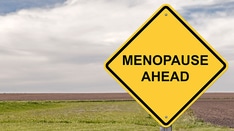The transition from perimenopause to menopause is accompanied by a proatherogenic shift in lipids and other circulating metabolites that potentially predispose women to cardiovascular disease (CVD). Now, for the first time, a new prospective cohort study quantifies the link between hormonal shifts and these lipid changes.
However, hormone replacement therapy (HRT) somewhat mitigates the shift and may help protect menopausal women from some elevated CVD risk, the same study suggests.
"Menopause is not avoidable, but perhaps the negative metabolite shift can be diminished by lifestyle choices such as eating healthily and being physically active," senior author Eija Laakkonen, MD, University of Jyväskylä, Finland, told Medscape Medical News in an email.
"And women should especially pay attention to the quality of dietary fats and amount of exercise [they get] to maintain cardiorespiratory fitness," she said, adding that women should discuss the option of HRT with their healthcare provider.
Asked by Medscape Medical News to comment, JoAnn Manson, MD, of Harvard Medical School, Boston, Massachusetts, and past president of the North American Menopause Society, said there is strong evidence that women undergo negative cardiometabolic changes during the menopausal transition.
Changes include those in body composition (an increase in visceral fat and waist circumference), as well as unfavorable shifts in the lipid profile, as reflected by increases in low-density lipoprotein cholesterol (LDL-C) and triglycerides and a decrease in high-density lipoprotein cholesterol (HDL-C).
It's also clear from a variety of cohort studies that HRT blunts menopausal-related increases in body weight, percentage of body fat, as well as visceral fat, she said.
So the new findings do seem to "parallel" those of other perimenopausal to menopausal transition studies, which include HRT having "favorable effects on lipids," Manson said. HRT "lowers LDL-C and increases HDL-C, and this is especially true when it is given orally," but even transdermal delivery has shown some benefits, she observed.
10% of Lipid Changes After Menopause Due to Shift in Hormones
The new study, by Jari E. Karppinen, also of the University of Jyväskylä, and colleagues, was recently published in the European Journal of Preventive Cardiology. The data are from the Estrogenic Regulation of Muscle Apoptosis (ERMA) prospective cohort study.
In total, 218 women were tracked from perimenopause through to early postmenopause, 35 of whom started HRT, mostly oral preparations. The women were followed for a median of 14 months. Their mean age was 51.7 years when their hormone and metabolite profiles were first measured.
Previous studies have shown that menopause is associated with levels of metabolites that promote CVD, but this study is the first to specifically link this shift with changes in female sex hormones, the researchers stress.
"Menopause was associated with a statistically significant change in 85 metabolite measures," Karppinen and colleagues report.
Analyses showed that the menopausal hormonal shift directly explained the change in 64 of the 85 metabolites, with effect sizes ranging from 2.1% to 11.2%.
These included increases in LDL-C, triglycerides, and fatty acids. Analyses were adjusted for age at baseline, duration of follow-up, education level, smoking status, alcohol use, physical activity, and diet quality.
More specifically, investigators found that all apoB-containing particle counts as well as particle diameters increased over follow-up, although no change occurred in HDL particles.
They also found cholesterol concentrations in all apoB-containing lipoprotein classes to increase and triglyceride concentrations to increase in very low-density lipoprotein and HDL particles.
"These findings including HDL triglycerides can be interpreted as signs of poor metabolic health since, despite higher HDL-C being good for health, high HDL triglyceride levels are associated with a higher risk of coronary heart disease," Laakkonen emphasized.
Among the 35 women who initiated HRT on study enrollment, investigators did note, on exploratory analysis, increases in HDL-C and reductions in LDL-C.
"The number of women starting HRT was small and the type of HRT was not controlled," Laakkonen cautioned, however.
"Nevertheless, our observations support clinical guidelines to initiate HRT early into menopause as this timing offers the greatest cardioprotective effect," she added.
The study was supported by the Academy of Finland. The authors and Manson have reported no relevant financial relationships. Manson is a contributor to Medscape.
Eur J Prev Cardiol. Published online May 12, 2022. Full text
For more diabetes and endocrinology news, follow us on Twitter and Facebook.
Credit:
Lead image: Aleksandar Mijatovic | Dreamstime.com
Medscape Medical News © 2022 WebMD, LLC
Send comments and news tips to news@medscape.net.
Cite this: Hormones Account for 10% of Lipid Changes After Menopause - Medscape - May 18, 2022.











Comments